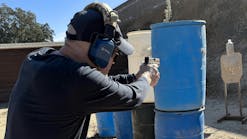Domestic violence is a repetitive cycle, and some have coined it the "revolving door syndrome." For professionals working in the criminal justice system, the challenge of dealing with the cycle of violence focuses on determining the best ways to deal with the issues and problems that surround it. In jurisdictions everywhere, police departments, prosecutors' offices, and victim advocacy programs all play a major role in confronting the challenges of arrest, prosecution, and victim services. Though each community must tailor the response to its specific needs, some successful models exist that can be considered examples of best practices.
The Chicago Police Department has a domestic violence program and a domestic violence advocacy program in place, directed by Sgt. Kathleen Argentino, who serves as the Domestic Violence Operations Coordinator (DVOC). Sgt. Argentino utilizes a comprehensive uniform police department strategy in dealing with victims of domestic violence and coordinates with other city, criminal justice, and community-based agencies. She supervises five police officers that are assigned to the domestic violence program and are responsible for supporting the Chicago Police Department personnel on domestic violence issues and community activities within the five police districts. They attend domestic violence subcommittee meetings and serve as representatives of the domestic violence program for events. Each officer has respective assignments that include domestic violence awareness and training both in-house and to outside agencies, faith-based initiatives, coordination with the state's attorney's office, the courts, and domestic violence liaison officers, as well as other department units.
The department is keenly attuned to recognizing domestic violence cases involving members of their own police family, and it was the first department in the country to acknowledge the problem by establishing, in 1994, a domestic violence advocacy program in which abusers are held accountable for acts of domestic violence. This program provides unique direct services to victims who are abused by sworn or civilian members of the department. An advocate from the program contacts victims and provides crisis intervention and assistance concerning available options. Self-referrals are accepted to the program as well as referrals from other sources.
Chicago also focuses on domestic violence through the state's attorney's office. In Cook County, there are four general misdemeanor domestic violence courtrooms, a domestic violence misdemeanor bond court, and a domestic violence felony preliminary hearing courtroom. There are 17 assistant state's attorneys who staff these courtrooms and the screening department. There are 16 specialized victim witness specialists assigned to the domestic violence division and a felony victim witness specialist who works in the felony trial division. These specialists are able to assist domestic violence victims through the criminal justice system by providing necessary services. The combined efforts of the police, the prosecutor's office, and the courts demonstrate the priority placed on domestic violence victimization in Chicago.
Though it polices a smaller community, the Alexandria (VA) Police Department also prioritizes the importance of combating domestic violence and has a specialized unit led by Sgt. Laura Barlow. It is comprised of four detectives, a social worker, and a secretary. This unit deals with all domestic violence and stalking cases, and every domestic violence report that is forwarded to the unit is reviewed and receives follow-up. The social worker reviews police information cases where no probable cause exists for an arrest, and she contacts the victims identified from those reports.
The unit meets weekly with a prosecutor for the purpose of "case rounds," at which time cases are discussed and the docket is reviewed to ensure that all necessary information has been obtained. The unit meets monthly with all components of the system involved with domestic violence, including sheriff's deputies, hospital nurses, school personnel, social services, and others. In addition, the unit frequently conducts roll call training that emphasizes the need for officers to be supportive of victims and enables them to understand the reasons why victims are reluctant or fail to appear in court. Det. Amy Santiago has worked in the unit for the past nine years, and she is proactive in her leadership and outreach to victims of domestic violence.
In the nation's capitol, Lt. Michelle Robinson of the District of Columbia Metropolitan Police Department supervises the domestic violence unit that has a liaison responsibility with other entities, including the U.S. Attorney's Office, courts, and probation and parole. Domestic violence that occurs citywide falls under Lt. Robinson's unit. Each detective unit has up to four domestic violence detectives; however, due to the nature of crime in the city, it is not guaranteed they will exclusively handle domestic violence cases.
The U.S. Attorney's Office has a domestic violence unit that has victim advocates available to interact with victims. Lt. Robinson states that it is important to "identify someone who will monitor and stay on top of these cases." A domestic violence intake center serves as a single access point for victims to enter the criminal and civil legal systems, receive crisis intervention, do safety planning, obtain assistance in pursuing protection orders, and receive assistance for legal representation. In a collaborative effort, six governmental and non-governmental agencies work together at this single access point.
In Ottawa, Kansas, Chief Dennis Butler's goal is similar when it comes to accessing the system--he wants to ensure there is always someone available to help and that proper follow-up is conducted. Chief Butler approaches the problem of domestic violence assertively. He makes it a priority to deal with the issue in a progressive manner in this rural Midwestern community, and he obtained a grant to fund development of a domestic violence program. He educates his officers on the pertinent issues and the law enforcement response vital to victims. Consequently, victims in his community are now more trusting of the police and are able to learn what options are available to them. Chief Butler sums up the entire matter succinctly when he states, "There is help out there. Law enforcement and advocacy alike need to do a better job of getting victims the follow-up support they need."
The development and implementation of effective strategies to deal with domestic violence and the impact of its victimization are critical to diminish the dysfunction that embraces the cycle of violence. The coordination and collaboration of components within the criminal justice system as well as allied agencies and the community have proven effective results not only for the identification, arrest, and prosecution of abusers but for victims' ability to make positive changes in their lives.



